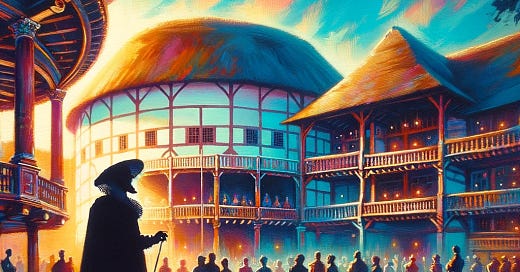Birth and Death Anniversary on 23rd April: Guess Who?
William Shakespeare (1564-1616): The Bard of Avon and His Enduring Legacy.
William Shakespeare: The Bard of Avon and His Enduring Legacy
William Shakespeare's life, works, and legacy have become synonymous with the very essence of English literature. His birthday and death coincide on April 23, a remarkable twist of fate that adds an intriguing layer to his enigmatic story. Shakespeare's journey from Stratford-upon-Avon to the heights of literary fame is a tale that encompasses a rich tapestry of history, drama, and influence.
Early Life and Birth
Born in 1564 in the quaint town of Stratford-upon-Avon, Shakespeare was the third child of John Shakespeare, a successful glover, and Mary Arden, a woman of noble descent. His baptism on April 26, 1564, is the earliest record of his existence, leading scholars to infer that his birth occurred a few days earlier, likely on April 23. Growing up in a town steeped in tradition, Shakespeare's education at the King Edward VI Grammar School provided a solid foundation in Latin, rhetoric, and classical literature.
The Dramatist Emerges
By the late 1580s, Shakespeare had moved to London, where he quickly became involved in the burgeoning theatre scene. His early career in London's theatrical circles was marked by collaboration and experimentation, with Shakespeare honing his craft in a variety of roles—from actor to playwright. His early works, such as "Henry VI" and "Richard III," demonstrated a keen understanding of historical context and dramatic tension, setting the stage for his later masterpieces.
Royal Patronage and The Globe Theatre
Shakespeare's career blossomed under the reign of Queen Elizabeth I and later King James I. His affiliation with the Lord Chamberlain's Men, a leading theatrical company, provided him with the opportunity to perform before royalty and aristocracy. The construction of the Globe Theatre in 1599 marked a significant turning point, allowing Shakespeare and his contemporaries to reach broader audiences. The Globe's circular structure and open-air design created a dynamic setting for his plays, where his words could resonate with both the common folk and the elite.
The Universal Appeal of Shakespeare
One of Shakespeare's enduring qualities is the universality of his themes. His works explore human emotions, relationships, and societal issues in a way that transcends time and culture. Shakespeare's ability to draw from diverse sources, including Greek tragedies, Roman history, and contemporary events, added depth to his narratives. He often borrowed from classical texts and other playwrights, weaving them into his unique interpretations.
Types of Plays and Tragic Heroes
Shakespeare's repertoire includes comedies, tragedies, histories, and romances. His comedies, such as "A Midsummer Night's Dream" and "As You Like It," are characterised by wit, humour, and complex romantic entanglements. In contrast, his tragedies, like "Hamlet" and "Macbeth," delve into the darker aspects of human nature, often centred on flawed tragic heroes whose fatal flaws lead to their downfall. These tragic heroes, with their internal conflicts and moral dilemmas, epitomise the complexity of Shakespeare's characterisation.
Shakespeare's Legacy in India
Shakespeare's influence extends far beyond England, reaching the Indian subcontinent in the 19th century during British colonisation. His plays became a staple in Indian theatre and education, with adaptations and translations into local languages like Hindi and Bengali. Shakespeare's universal themes resonated with Indian audiences, and his plays were reimagined to reflect Indian cultural contexts.
Wit, Wisdom, and Historical Dramas
Shakespeare's command of language and his sharp wit are evident throughout his plays. His use of wordplay, metaphors, and soliloquies demonstrated his mastery of the English language. His historical dramas, like "Henry V" and "Julius Caesar," offered insights into the power dynamics and political intrigues of their respective eras.
The Enduring Legacy of the Bard
Shakespeare's legacy endures because of the depth and range of his work. His plays are still performed and studied worldwide, a testament to his enduring relevance. The Globe Theatre, reconstructed in the 20th century, stands as a symbol of his impact on theatre and culture. As scholars continue to explore his works, new interpretations and insights emerge, ensuring that Shakespeare remains a pivotal figure in the literary world.
In summary, William Shakespeare's life and times are a fascinating journey through the world of theatre, history, and literature. His universal themes, tragic heroes, and innovative storytelling have cemented his place as one of the greatest playwrights in history, with an influence that spans continents and centuries.





